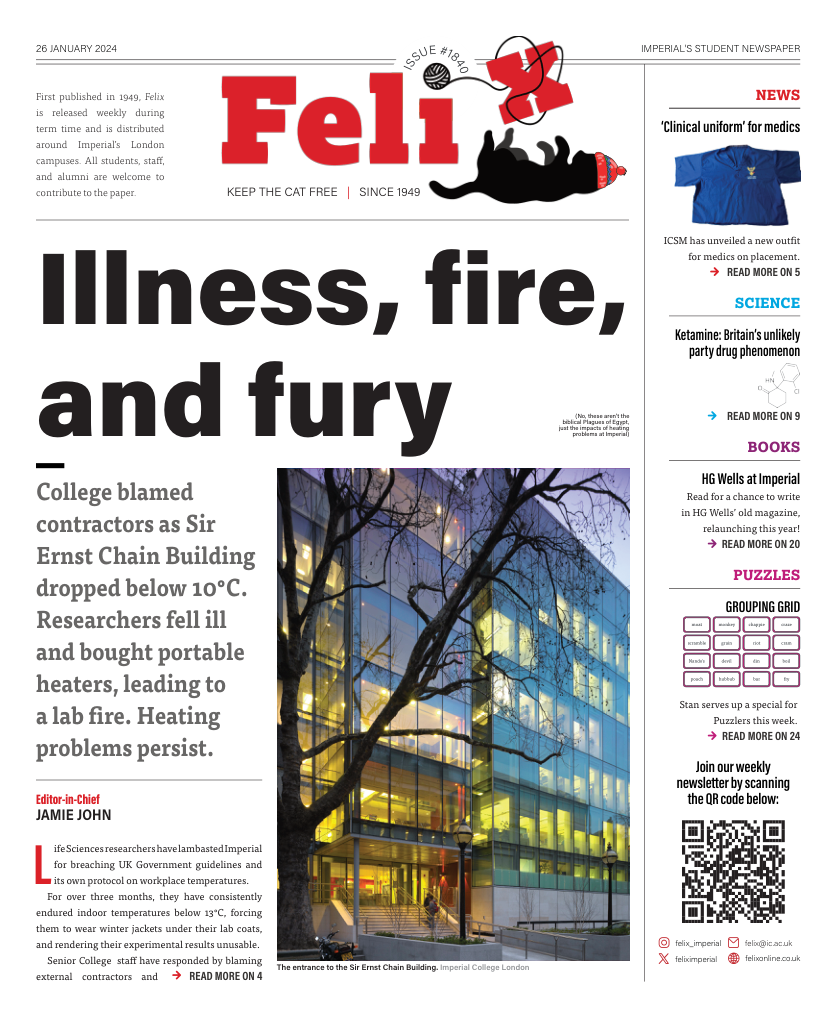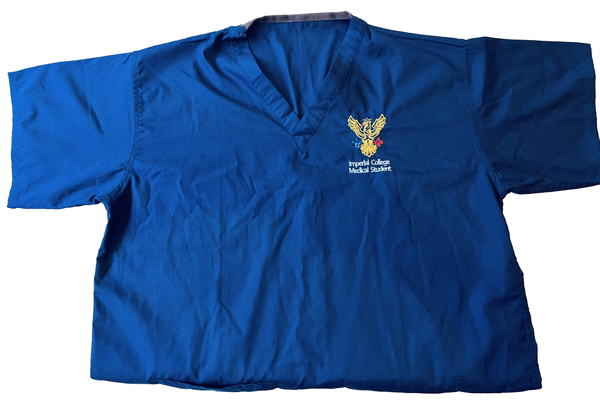Illness, fire, and fury as Sir Ernst Chain Building falls below 10°C
Researchers fell ill and bought portable heaters, leading to a lab fire. Heating issues persist.
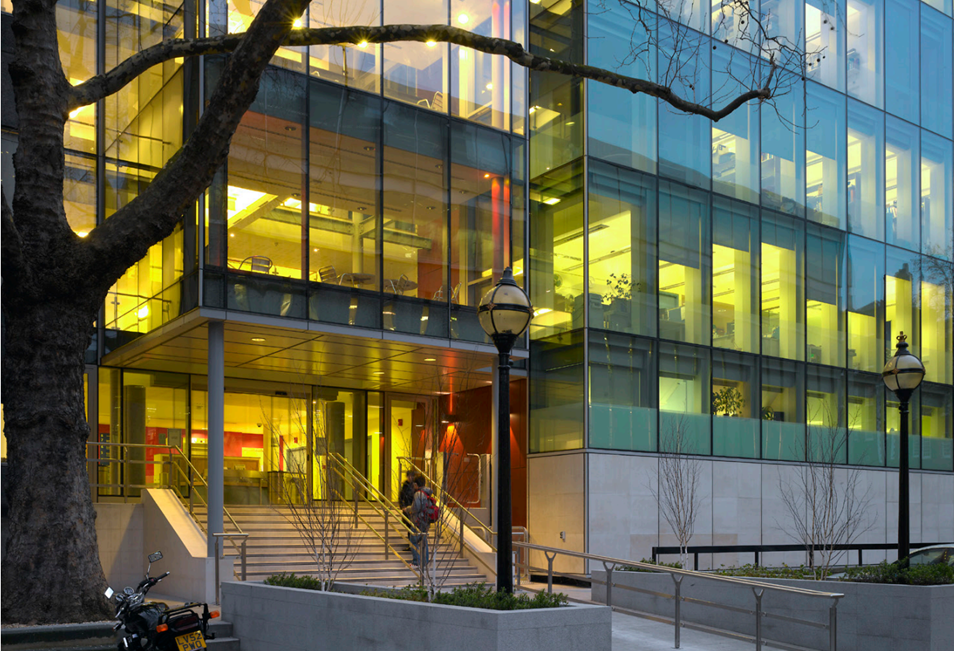
Life Sciences researchers have lambasted Imperial for breaching UK Government guidelines and its own protocol on workplace temperatures.
For over three months, they have consistently endured indoor temperatures below 13°C, forcing them to wear winter jackets under their lab coats, and rendering their experimental results unusable.
Senior College staff have responded by blaming external contractors and ‘technical difficulties’, and telling a distressed building user to take ‘regular breaks’ away from their workplace to ‘warm up’.
With no solution on the horizon, researchers purchased portable fan heaters to use at work, leading to a small fire in a laboratory.
Members of the College’s Estates team had assured them that heating would be restored in mid-November, but the issues have persisted into the new year.
“We suffered through this and have had to go to extreme lengths just to be comfortable enough to do our work,” said Life Sciences student Daniella Pretorius, who says her open letter on the problems has garnered the signatures of nearly a quarter of PhD students in her department.
She called for the College to hold an inquiry, adding, “We deserve for someone to be held responsible, and assurance that this will never happen again.”
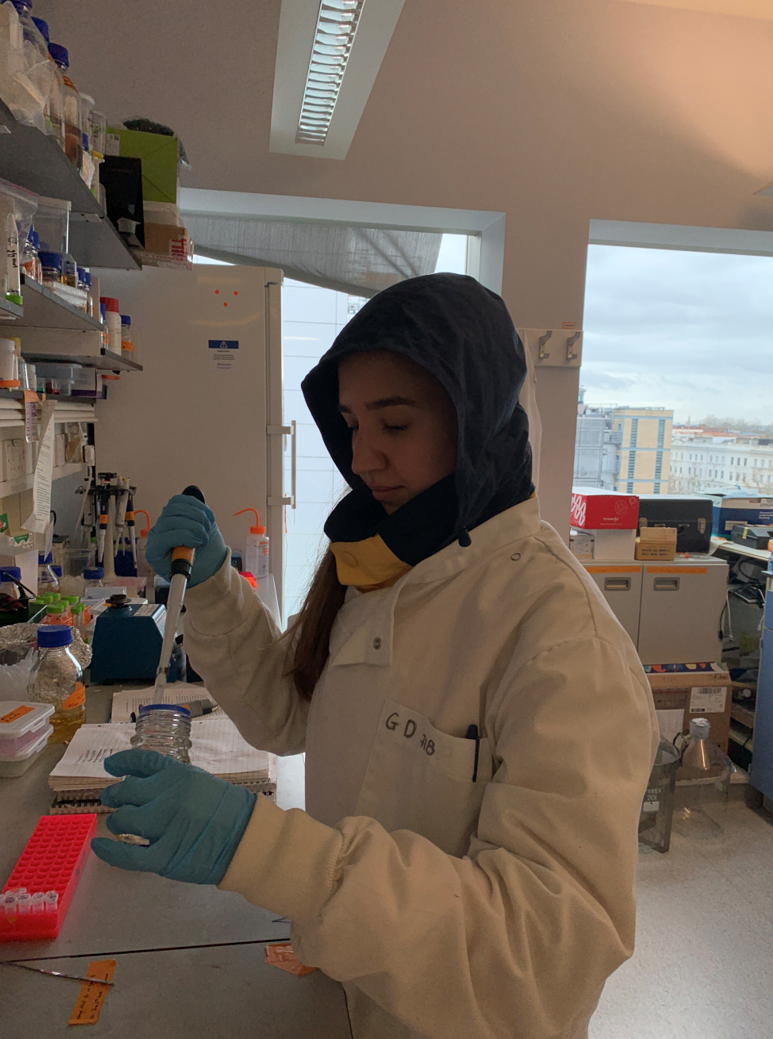
To reach net-zero by 2040, Imperial is upgrading the heating network on its South Kensington campus by replacing its steam-based infrastructure.
The work was originally planned to be completed by November 2023, but has been beset by delays and is now expected to finish by Easter 2024.
A temporary heating system – in place while the existing network is updated – has failed to meet a surge in demand, and last week led to complaints from students across the South Kensington campus.
But in the Sir Ernst Chain Building, home to the Department of Life Sciences, the problems began in October, when researchers noticed their building’s heating supply was not functioning.
They took to wearing several layers of clothing and winter jackets inside labs, and found that their experimental work was being affected.
As indoor temperatures fell, chemicals began to precipitate out of solutions, and ‘room temperature’ experiments took place at less than 13°C – a serious problem for those working with living organisms like mosquitoes and flies.
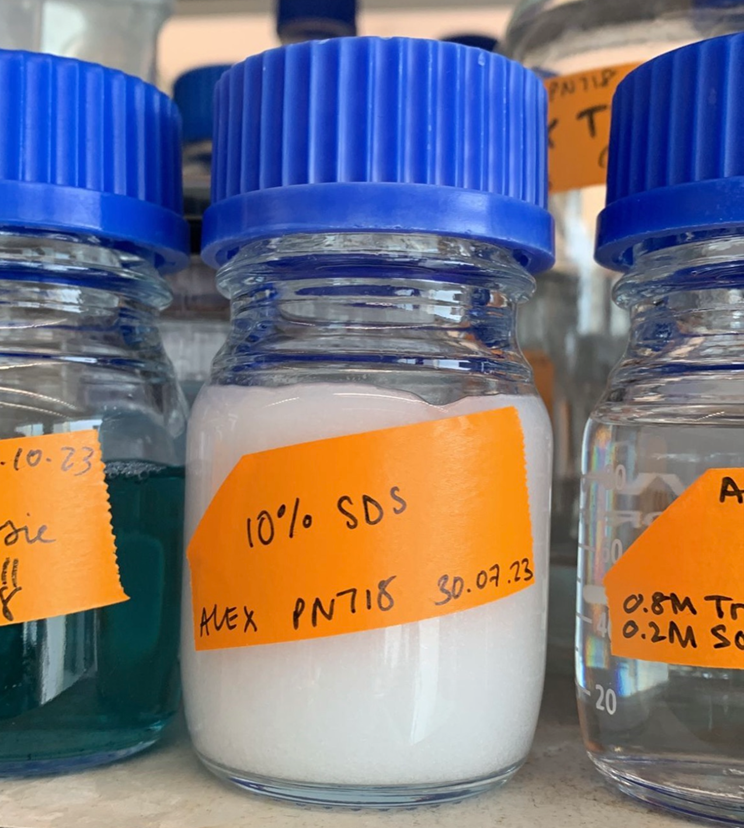
Researchers of all ages started to fall ill working in the cold laboratories, and on at least one day in November, the temperature inside the building fell below that measured outdoors.
Imperial’s building temperature protocol prescribes that ‘heating will be delivered within 2°C of 20°C’. The Health and Safety Executive, a government regulator, suggests a minimum workplace temperature of 16°C.
Occupants complained to the College on 7th November and were initially told that heating would be restored on 9th.
In the meantime, a member of the College’s Health & Safety team recommended that ‘a warm refuge’ be provided by placing heaters in a common room, and that occupants of cold spaces take ‘regular breaks’ there to recover.
The College delivered spare heaters to the building, but not in sufficient numbers to keep people warm, so researchers continued to purchase portable heaters at their own expense.
On 8th November, a senior member of the Estates team apologised to the building occupants, assuring them that ‘we have learnt the lessons from this fiasco’.
‘Simplifying this message, you will have heat on Monday 13th November 2023,’ they added, pushing back the date on which heating would be restored.
On the same day, Imperial’s Director of Estates Operations responded to an email addressed to President Hugh Brady and Provost Ian Walmsley, explaining the reasons for the delays.
He described the decarbonisation project as a ‘highly complex undertaking’ requiring ‘a number of contractors’, and said that one contractor had been ‘overly optimistic’ on completion dates.
Records obtained by Felix reveal that Imperial was so dissatisfied with the work of the contractors that it ‘insisted on a change to [their] senior management’.
‘Technical difficulties with a key component’ had also contributed to the problems, but had since been resolved, meaning heating could be returned to the building.
Heating was restored on 13th November as promised, but by the following week, it had failed again, and researchers returned to using portable heaters.
Then in early December, a portable fan heater caused a fire in a laboratory.
The fire was small and quickly doused with a fire extinguisher, but the Faculty of Natural Sciences Safety Team sent out an email to Life Sciences researchers, banning portable fan heaters and instead requiring the use of oil-filled radiators.
This has frustrated building occupants, who feel that not enough has been done to provide substitutes for the heaters they have already purchased.
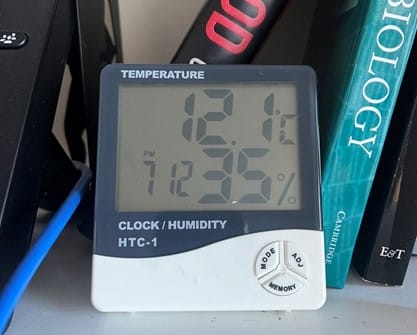
As outdoor temperatures plummeted last week, the temperature within the Sir Ernst Chain Building fell to 9°C.
Exasperated by the conditions, PhD students in the building have added their names to an open letter penned by Pretorius. The letter, which currently has 33 signatures, will be sent to the President and Provost.
It outlines how ‘multiple heating system failures’ continue to harm the students’ health and ‘compromise’ their ‘research integrity’.
‘Staff and students either sacrificed their experiments or their health and well-being; the majority of us had little choice but to accept the latter,’ it says.
It criticises ‘inadequate planning’, ‘poor communication’, and ‘a disturbing disregard for the welfare of our community’.
The weather has improved over the past week, but heating issues remain a concern for researchers.
“I think people are just at a loss at what to do,” said Pretorius. “You would come in every day – it was literally below 15°C.”
“It’s the research that we’re doing that is bringing Imperial its name, credentials, money and status. But we feel like an afterthought in this entire thing.”
An Imperial spokesperson apologised for the heating issues in the Sir Ernst Chain Building, saying: ‘We are trying to resolve [them] as quickly as possible.’
To address the campus-wide problems with the temporary heating system in the short term, Imperial said it has ‘been running our heating system round the clock and distributing plug-in heaters to affected areas. The Estates team has been in regular communication with key staff in the building to enable them to keep building users up to date.’

